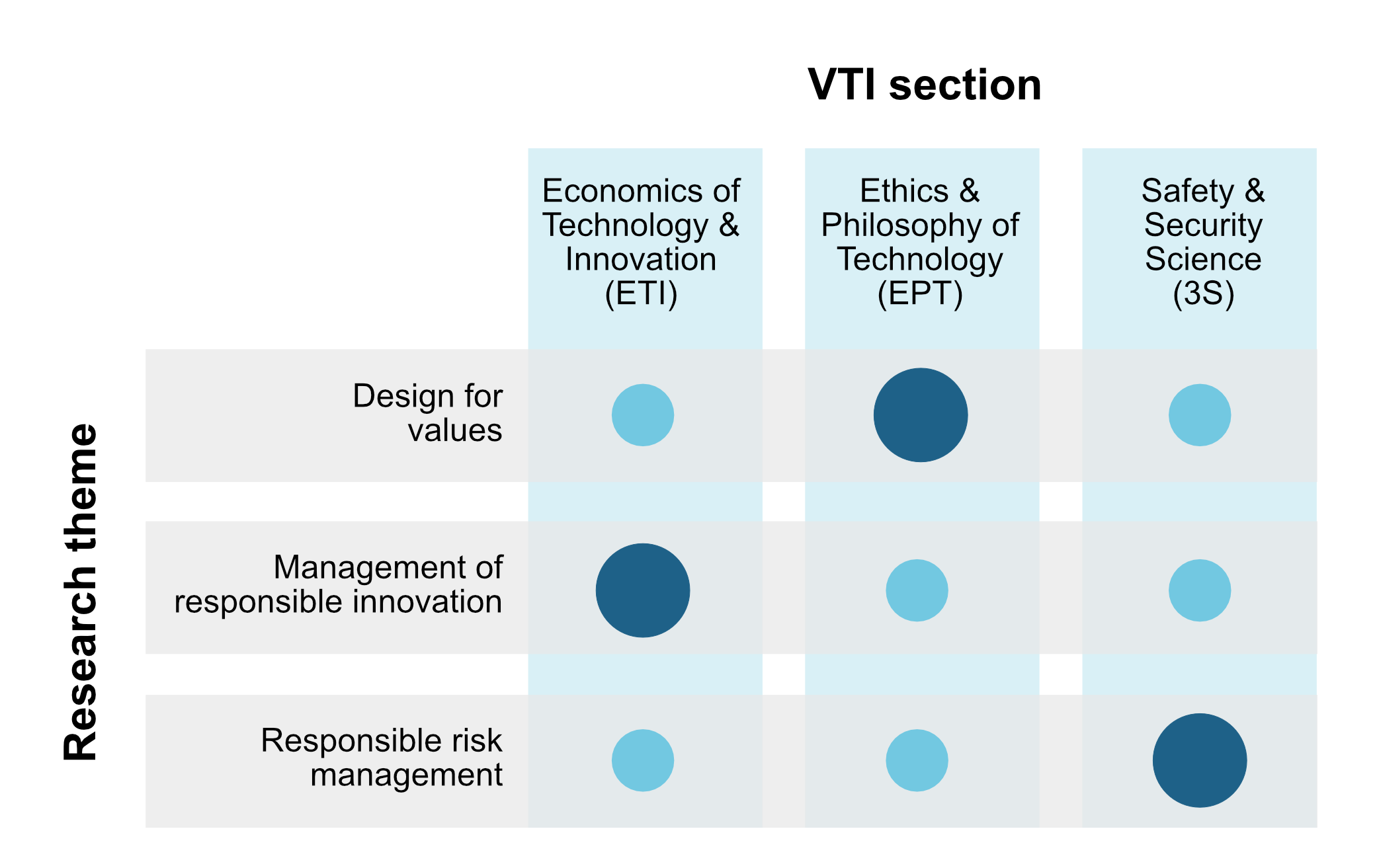Key Research Themes
within our main theme Responsible Innovation
We study responsible innovation with regard to a broad range of technologies and application areas, like digital technologies (including AI and robotics), energy, water, transport, the chemical industry, health technologies and biotechnologies.
Our approach is to examine innovation (1) from the perspective of societal, public and ethical values and (2) within the context of socio-technical systems. Our key research themes are:
1. Design for Values

How can we integrate values into the design of technologies, institutions and sociotechnical systems?
The Design for Values approach aims to integrate ethical values - such as safety, security, justice, autonomy, privacy, and sustainability - into the design of new technologies and innovations right from the start.
Contributions by...
-
The Section Ethics & Philosophy of Technology is the main focal point for work on Design for Values. This important approach to realize responsible innovation raises various challenges, like:
- How to understand and operationalize values?
- How to understand and deal with value conflicts in design?
- How to understand and deal with responsibility gaps?
- How to understand and deal with tensions between collective and individual responsibility?
The theoretical and applied work by the EPT section contributes to adressing such challenges.
-
Several members of the section Economics of Technology & Innovation (ETI) focus on institutional design aimed at achieving responsible innovations. Institutions are the result of formal and informal norms that exist in a society. However, institutions once developed have a strong path dependency and are therefore not easily changeable in the short term. The ETI section aims to investigate how existing institutions can be changed when dominant values change, thereby contributing to Design for Values.
-
The Section Safety & Security Science (3S) contributes to Design for Values with a particular focus on the value of safety, which is called the 'Safe by Design' approach. Differences, commonalities, and possibilities for mutual learning found in various practices have been identified, and several ways of putting these disciplinary outlooks into perspective have been elaborated on.
The potential benefits of succesful design for values:
- more inclusive decisionmaking about the design of technological innovations
- improvement of technologies/design by better embodying important ethical and societal values
- avoidance of technology rejection due to a mismatch with the values of users or society
- generation or stimulation of values in users and society through design.
Key challenges addressed in our research include:
- Value conflicts in design. Value conflicts may arise because different stakeholders hold different values but also because a technology can usually not meet all values that are relevant for its design, so that decisions have to be made for example through value trade-offs.
- The role of institutions. Institutions can often not be designed from scratch because they usually already exist and evolve over time. Doing justice to values requires insights in how institutions develop, how institutions impact technological development and how they relate to values.
- The value of responsibility. Determining and enhancing responsibility in sociotechnical systems is often problematic. Innovation and design are collective efforts and the causal chains between the innovators and the eventual social effects are long. In addition, a range of new technologies raise new responsibility problems; think for example of drones, robots and self-driving cars that autonomously make decisions. This may result in tensions between collective and individual responsibility and in responsibility gaps.
Approaches/methods of our department to studying this question include ethics of technology, design methodology, value-sensitive modelling, etc.
Design for Values not only requires in-depth monodisciplinary research, but also multidisciplinary research, to do justice to the complexity of the challenges of responsible innovation. Members of the Department of Values, Technology & Innovation therefore collaborate with members of all engineering disciplines at TU Delft and elsewhere to further develop the Design for Values approach.
2. Management of Responsible Innovation

How can we operationalise, manage and incentivise responsible innovation within innovation systems?
Succesful responsible innovation does not only increase the societal desirability and ethical acceptability of products and systems, but also remains economically feasible.
Contributions by...
-
The Section Economics of Technology & Innovation (ETI) is the main focal point for our work on the Management of Responsible Innovation. ETI reseachers incorporate responsible innovation in their analyses of innovation systems, thereby adding a value dimension to the well-established strand of innovation systems and ecosystems research as well as to innovation economics and management.
-
The Section Safety & Security Science also contributes to the research theme of the management of responsible innovation. Human behaviour is at the core of creating and maintaining a safe environment. And vice versa, a safe environment is at the core of learning, growth and progress. Both elements are elemental to a safety culture that is also known to contribute to optimal team performance.
-
Members of the Section Ethics & Philosophy of Technology develop various philosophical and normative theories and approaches to study the responsible management of technology in its social and political context. These include frameworks for
- technology assessment
- the governance of sociotechnical innovation
- public deliberation on technology development.
We make a novel contribution to innovation systems research by incorporating responsible innovation and a value dimension. We do this by building on insights that we have developed in the past with respect to innovation management. However, our more recent focus on managing responsible innovation gives rise to new challenges, including:
- Breaking through existing patterns of innovation. From innovation studies, it is known that new players, like start-ups, may play a crucial role in doing so. Studying the role of entrepreneurship for responsible innovation is therefore very important.
- Operationalizing and incentivizing responsible innovation. An intrinsic motivation to take responsibility by making innovations more sustainable might be “crowded out” by economic incentives. Moreover, in many sociotechnical systems, such as energy, transport and communication infrastructures, the incentive structure is embedded in the sector regulations and/or public oversight. This raises the question how we can stimulate responsibility in sociotechnical systems given that incentive structures are usually difficult to change and given that incentive structures that work on the short term might have detrimental effects (due to “crowding out”) in the long run. This requires empirical studies and indicator development in combination with a normative perspective.
Approaches used in the department to studying this question include economic and management approaches, multidisciplinary approaches to RI, etc.
3. Responsible Risk Management

How are we to assess, manage and evaluate the risks of technologies and sociotechnical systems in a responsible way?
Risk is a key concern when it comes to responsible innovation. Effects of (responsible) innovation are frequently uncertain and may only surface once technologies have been introduced into society.
Contributions by...
-
The Section of Safety & Security Science (3S) is the focal point of the department's research on Responsible Risk Management. The aim is to develop approaches for proactive and reactive measures to improve safety and security levels while respecting other conflicting values and uncertainties.
-
The Section Ethics & Philosophy of Technology (EPT) is a key player internationally in the domain of risk ethics. Traditional ethical theories have a hard time dealing with probabilities and uncertainties. Alternative approaches developed by our researchers shed light on the importance of, for example, resilience, inter- and intragenerational justice concerning the risks of energy technologies and the role of emotions and intuitions in ethical reflection on risk.
Furthermore, risks cannot be completely predicted or anticipated. Researchers in Safety & Security Science investigate this using safe-by-design principles, while our researchers have proposed considering the introduction of new technology into society as a social experiment in which risks and benefits only gradually become clear.
Our researchers also explore how works of art can contribute to ethical reflection on future scenarios that are hard to imagine and predict but nevertheless may require early interventions.
Finally, several people are working on the notion of normative uncertainties.
-
The contribution of the Section Economics of Technology & Innovation (ETI) to this research theme is the assessment of how the trade-off between, or the optimisation of, efficiency and safety is affected by changing institutional economic environments. For example, the economic liberalisation or deregulation of the gas distribution markets in the EU implies that the change between gas suppliers has become relatively easy. However, different gas suppliers deliver gas of different calorific values: a situation which can have safety consequences. The models developed to deal with these research questions do also take into account other values than efficiency alone, i.e. sustainability and ethical values.
With scientific methods and techniques, we study how to identify, quantify, predict, prescribe, visualise and optimise risk and hazard levels to acceptable levels, explicitly incorporating normative aspects and values. Challenges that we address in our research include:
- Modelling and predicting risks, taking into account technological, organizational and human factors. In order to address this, an important approach we develop and apply is that of Bayesian Belief Networks (BBNs) for risk assessment.
- Integrating safety (unintentional harm) and security (intentional harm) in risk assessment and management, as safety and security increasingly interact and depend on each other. Here, among other things, we apply game theory to better understand and model such interactions.
- How safe is safe enough? We investigate how moral values can be integrated in risk assessment and risk management, while also paying attention to an economic point of view. This gives rise to the question as to how to take into account the role of moral values and of emotions in the already existing more formal frameworks for making decisions about acceptable risk. From a philosophical point of view, the topic of risk requires new theories because traditional ethical theories have a hard time dealing with probabilities and uncertainties. The Ethics and Philosophy of Technology Section is internationally a key player in this new domain of risk ethics.
- Risks cannot be completely predicted or anticipated. We investigate this for example by considering the introduction of new technology into society as a social experiment in which risks and benefits only gradually become clear.
Approaches used in the department to studying this question include Bayesian Modelling, Safety Culture, Risk Ethics, etc.

